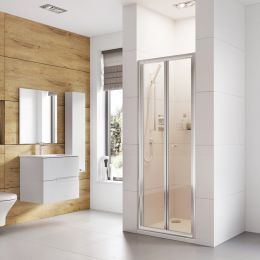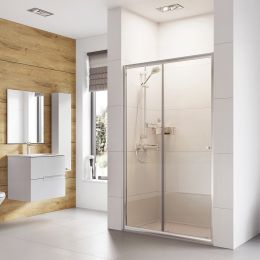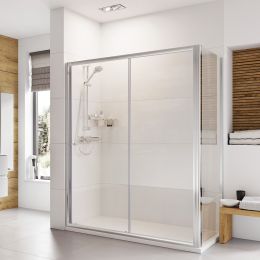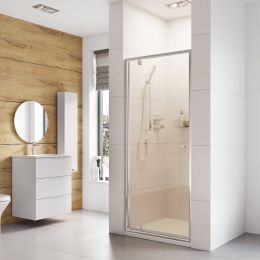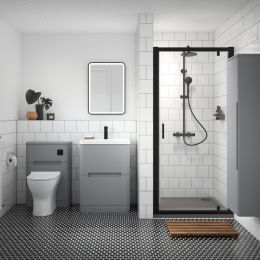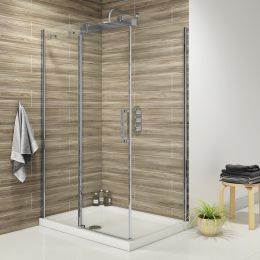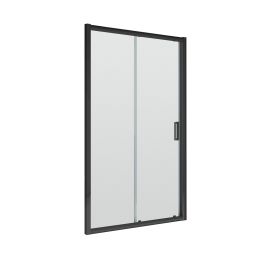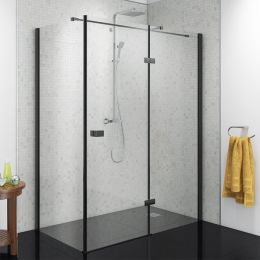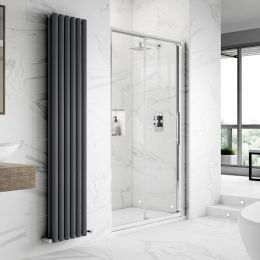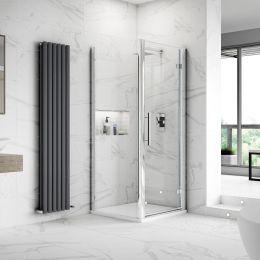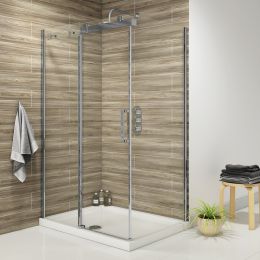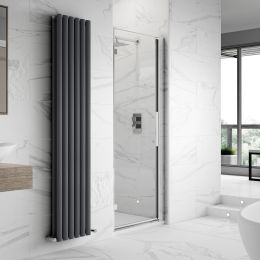If you’re looking for new shower doors for your bathroom renovation, you may be wondering which type to choose. There seems to be an endless array of options on the market today, so how do you pick between the various doors available? Making the right choice isn’t only important for the aesthetic of your room, but it’s also important for the function of your space too.
Therefore, knowing the pros and cons of each door model on the market is the best way to make a well-informed decision. In this helpful buyer’s guide, we’ve brought together all the details you need to know so that you can embark on shopping for your new shower doors in complete confidence.
The Different Types of Shower Door
First, let’s take a closer look at the different types of shower door that you can choose from:
Sliding shower doors
A sliding shower door is a perfect space saving solution if you have a smaller bathroom since it allows a compact and slim shower enclosure to be created. Some sliding doors are even suitable for use with curving shower cubicles, therefore you can choose any shape of enclosure you prefer.
Small bathrooms are more and more common in modern housing, but with a sliding shower door you won’t need to find additional floor space since it won’t open outward. Sliding doors are especially popular in guest bathrooms and ensuites since these spaces are usually somewhat more compact than master bathrooms.
There is a downside to sliding doors, however. They tend to offer a smaller entry space to get into and out of your shower enclosure.
Hinged Shower Doors
A hinged shower door is a simple and practical style that is very traditional. As you might imagine, hinged shower doors feature hinges on one side of the panel, allowing the entire door to swing outward into your bathroom. If you have a large bathroom that offers ample floor space, a hinged door is ideal since you have enough room available to accommodate the door’s outward movement.
You can opt for the hinges to be located to either the right or the left of the door, giving you the most convenient access to the cubicle. There are hinged doors available for both straight and curved shower enclosures, and they keep the enclosure secure to guard against water or steam damage in your bathroom. They’re an especially good choice for square and rectangular cubicles.
A hinged door creates a timeless look in your space, and with so many different styles available you’re sure to be able to find one that matches your chosen décor. On the downside, though, if you have a small bathroom or lack sufficient floor space, a hinged door may not be the right choice for your needs. Since the door opens fully outwards, you need space surrounding your enclosure to accommodate this door type. A sliding door may be a better option for you in this case.
Pivot Shower Doors
To create a modern look in your newly renovated bathroom, a pivot shower door is a great choice. Stylish and good-looking, pivoting doors are also exceptionally convenient thanks to their pivoting hinge which swings through a 180 degree rotation to open outwards or inwards. Pivot door hinges are able to be fixed onto either the left or right of the shower door so you can facilitate the easiest possible access to your shower enclosure. In fact, if you prefer, you can even centre mount the pivot door hinge for even greater functionality.
Pivot doors may be contemporary but they’re also simplistic, simply opening and shutting with an outward or inward movement to suit your individual bathroom space and, of course, your own preferences. Pivoting doors open exceptionally wide, and may even lie flat against the shower enclosure wall making them a perfect choice for your large family bathroom and for homes where easier access to the cubicle is required.
On the downside, though, it’s important when choosing this door type to keep in mind that nothing must be stored on the side to which the door opens that may prevent the door from being able to full open. Also, if you have a small bathroom, a pivot door may make the space feel quite cramped.
One further consideration to consider is that rugs or carpets may get soaked if you opt for an outward opening pivoting door. For this reason, pairing this door type with a wet room design or with a non-slip tiled floor is often the best solution.
Bi-fold Shower Doors
Bi fold shower doors represent an excellent solution if you need to save space in your smaller bathroom. Thanks to a modern and convenient design, bifold shower doors aren’t only stylish, but they’re also highly functional. They work equally well in small and large shower enclosures alike, since they effortlessly fold into the enclosure with no encroachment on your bathroom floor space. Therefore, if a hinged or pivot door isn’t suitable for your shower enclosure, a bifold door may be the ideal alternative.
There are two main types of bifolding doors – ones that have three folds and ones that have two – so you can opt for the version that suits your preferences and your space best. Both types look elegant and offer outstanding functionality, and can turn your shower cubicle into a true design statement in your home.
Wetroom Panels
Technically speaking, wet rooms have no doors, but since they’re a popular option for bathrooms today, they’re included in this list. You don’t actually need to choose a door for your shower enclosure if you opt for a complete wet room. The shower head can simply be installed in any location of your choice inside the space.
Even better, wet rooms mean that there is no need to find a way of protecting the remainder of your bathroom from water damage. Therefore, if you want a convenient option that requires no door installation, a wet room may be the option you need.
Wet rooms aren’t just exceptionally stylish, they’re also perfect for households where someone has a mobility problem, since there will be no shower tray to step into and, therefore, no risk of falls. Wet rooms are the number one choice for older people and for those in wheelchairs, but many other homeowners are now opting for this design too since they can bring a true wow factor to the space.
Low threshold shower doors
There are a couple of reasons for choosing low threshold shower conversions. Not only are they perfect for increasing safety when showering, especially for older people and those with reduced mobility, but they’re also a minimally disruptive option for your renovation. Low threshold shower trays simply sit on the existing floor surface, and may be precisely sized to fit into the available gap. Although a low threshold shower doesn’t provide quite the same level of unobstructed access to the shower cubicle as a wet room or level access shower, they’re a better option if you want greater safety while washing. A low threshold shower door is designed specifically for use with this type of shower enclosure, with a door that has extra length to fill the additional space.
What types of Shower Door are best?
There can be no single answer to the question “which type of shower door is best.” That is because the answer will always depend on several factors including personal preference and the space that the shower door is being used in.
For example, if you have a very small bathroom with minimal floor space, the best type of shower door for you will probably be a sliding or bifolding shower door which will take up minimal room space. On the other hand, if you have a very large shower enclosure, a sliding door may be the right choice for your needs. If you are choosing a shower that is more than 1400mm, a wet room panel with a 500mm gap is the recommended choice, while if ease of access is important to you, choosing low threshold shower doors or wet room panels will help you meet those requirements.
What Thickness Glass Should I Choose
There are several different thickness of glass that you can choose from when it comes to selecting the right shower doors for you. In generally, the thicker the shower door glass, the better, however the true sign of good quality will be in the parts and components including the wheels and hinges.
Glass that is 4mm or 5mm thick is a budget option, and will have lighter, lower-quality wheels and hinges.
The majority of shower enclosures and doors have glass that is 6mm – 8mm in thickness, and that represents mid to high quality.
If you’re choosing a frameless shower enclosure, you can expect the glass thickness to be 10mm, but this is a high end choice, although the weight of the glass is a consideration if you choose this option. In terms of rigidity, 8mm thick glass is just as good as 10mm glass.
Easy Clean Glass or Not?
Easy clean glass is now an option for many different types of shower doors and while there is no need to go for this choice, it’s generally a good idea for most people. After all, the majority of homeowners would prefer to avoid spending a long time cleaning their shower door glass! Therefore, it’s worth the extra amount that you’ll pay for it.
Framed or Frameless Shower Enclosures
Most shower enclosures today are framed because they are more rigid and more reliable overall. However, if you prefer the contemporary elegance of a frameless shower enclosure, you need to be sure that you’ve chosen a high-quality model. While frameless showers are minimalistic and help to create a designer look in your bathroom, a low quality frameless enclosure will flex over time and could possibly leak.
Do you have to have a shower tray to fit a Shower Door?
There is no need to have a shower tray to fit your shower door. Generally they can be fitted straight on to a tiled floor. Most installers will prefer fitting a door on to a tray as its easier to get a seal along the bottom of the door or the bottom profile - tiles will generally have grout lines which can be difficult to seal properly.
How much do Shower Doors cost
As you might imagine, shower doors come in at a range of price points, so the answer to the question of how much they cost will depend on numerous factors. For example, the thickness of the glass, the finish, whether the design is frameless or framed, and the length of time the door will take to fit will all figure into the final price. Let’s take a closer look at the different factors that will impact the overall cost of you shower door:
- The thickness of the glass – there are several different glass thicknesses for you to choose from. A 4mm thick door will be more affordable than a 10mm thick door, but a thicker glass will also be more durable.
- Size of the shower door – of course, if your shower door is bigger it will cost more to install since more materials are required to make it. If you’ve opted for a bespoke size of door, the price will be even higher since it may need to be constructed by a specialist.
- Style of the shower door – some brands of shower door are more expensive than others, and some styles of door are cheaper than others too.
- Shower door finish – there are various finishes that you can opt for when choosing your shower door. From matt black doors to brushed brass or chrome, each finish comes with its own price tag.
- Installation time – in most cases, it will be possible to fit your shower door along with the rest of your shower components in a day, but if you are opting for wet room panels, it will probably take longer due to the more extensive renovation of the space. You will need to determine the tradesperson’s rate for the length of time your installation process is likely to take and add it to the cost of the shower door itself.
In general, the price of a shower door installation will be between £130 and £450, but you should bear in mind that frameless doors will usually cost more to install than framed doors. If you opt for a thicker tempered glass door, you can expect to pay a higher price too when purchasing your door.
What else will I need?
When renovating your shower, as well as shower doors you will also need either a shower tray or wetroom former tray, and, of course, the shower itself. Depending on the shower you choose and the look that you’re going for, you may need to consider accessories such as handles too. Fortunately, there are plenty of different options for you to choose from that will fit into spaces of all shapes and sizes, and will align with any budget.
What Else Do I Need To Consider
There are a number of things that you need to consider when you’re choosing the right type of shower doors to suit your bathroom renovation project. While you may wish to choose the most stylish option on the market, there’s a lot more to making a sensible decision than just that. Here, we take a closer look at some of the most prominent considerations to keep in mind when making a well-informed purchasing choice:
- The space you have available – there’s no point in choosing a shower door that will take up too much room in your bathroom or that will not have sufficient space to open outwards. A hinged door that opens fully may not be appropriate for a compact bathroom. If you are choosing a larger shower enclosure, you may want to choose a walk in shower rather than a door due to the improved accessibility and lower cost of taking this option.
- Your bathroom style – a top consideration will always be your chosen bathroom aesthetic. If you’re going for a traditional, classic look you’re going to want to choose a shower door that works with that style rather than an ultra-modern door that looks out of place.
- Who will be using your shower- accessibility may be an issue for you if somebody in your household who will be using the shower is elderly or has a mobility problem. A low threshold shower door or wetroom panels may be the right choice for you in such cases.
- Fittings – the installation of your shower is another aspect that you’ll need to consider. Will you be replacing a bath? Also, are the walls true? The width of your door must also be taken into account.
- Measurements – making sure your measurements are accurate is essential when selecting a shower door for your space. If you make an error, you’ll experience some significant issues after purchasing it! Never guess which size of shower door you’re going to need. Make sure to use a tape measure to get correct measurements, with the depth, height, and width in millimetres properly measured.
- Shower enclosure location – the location of your shower enclosure could well have an impact on the type of door that you’re able to choose. A corner shower won’t have as much space for the door as a shower located in the centre of the wall, for example. You’ll also need to check whether the door needs to be hinged to the left or the right, or whether a centre fixing is needed for a pivoting door.
- Do you need a bespoke door? – once you have accurate measurements, you need to choose a door that fits into the designated space. Remember, though, that common shower enclosure sizes will always be easier when it comes to buying a door to match. If you opt for a size that is outside the standard range you may require a specialist bespoke door. That may be ideal for you, but bear in mind the extra hassle and expense that this will incur.
- Your budget – of course, one more consideration is how much you can afford to spend on your new shower door. While you may be tempted to push the boat out and invest in the most stylish, high end door on the market, you need to be sure that you’ve made a purchasing decision that fits into your available budget. Before you even start shopping for shower doors, take the time to determine exactly how much you’re prepared to pay for your chosen door and then stick to that amount.
- Opening mechanism – depending on the shape of your bathroom, you may have free reign when it comes to deciding which type of opening mechanism you want. With hinged, pivoting, bifolding, and sliding doors to choose from as well as wetroom panels, you may be spoiled for choice! If there’s no specific reason for choosing a particular mechanism, you can simply go with your preference.
- Glass type – you have two options when it comes to the glass for your shower doors – transparent or frosted glass. If you’re keen to achieve greater privacy, frosted glass could be right for you, but if you’re looking for a sophisticated and clean look, transparent doors are more elegant and stylish. You also have a choice of thicknesses to pick from, ranging from 4mm up to 10mm. You’ll need to consider which thickness of glass fits into your budget and which is the right choice for your needs, bearing in mind that a thicker glass will have greater rigidity and be of a higher quality.
It isn’t always easy to choose the right shower doors for your new bathroom renovation, however, whether you’re refitting your family bathroom, a guest bathroom, or an ensuite, you can be sure that there will be the perfect shower doors for you out there.
With so many different options, sizes, finishes, and designs to choose from, you can find both traditional and contemporary looks in our range. Armed with the information in this helpful buyer’s guide, you’ll also be well-equipped to make a well-informed purchasing decision so you can find the shower door that ticks all your boxes.


